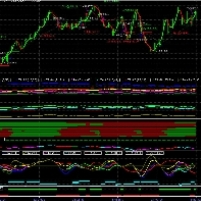Like Athletes who Dope, Wall Street’s High-Speed Traders Try to Keep Ahead of Regulators
Thursday, August 16, 2012

Cheating is a diehard temptation for athletes and speculators, making it imperative for regulators to keep up with changes in the game and ways for people to skirt the bounds of legality. This is especially true on Wall Street, where high-speed computer trading has grown significantly, and so have accompanying risks.
High-speed trading firms now account for more than 50% of all stock trading, with shares bought and sold within millionths of a second. This reality has created opportunities for wealth making and dirty dealing, or just expensive mistakes. Recently, Knight Capital lost $440 million in less than an hour because of bad computer software intended to upgrade the firm’s high-speed abilities.
As previously reported by AllGov, in traditional stock trading, a broker, or “specialist,” matches buyers and sellers at a price that is satisfactory to both. Generally, a buyer will tell the broker his top price and expect the broker to actually find a seller at a lower price. However, in computerized high-speed trading, wealthy firms can use “flash trading” to send out automated sell offers at higher and higher prices until one comes back with no buyer. The program then drops back to the highest acceptable price and sells at what the buyer set as his maximum limit.
Edgar Perez, author of The Speed Traders: An Insider’s Look at the New High-Frequency Trading Phenomenon That Is Transforming the Investing World, says government regulation must accelerate in order to keep up with Wall Street. Perez adds that this means the Securities and Exchange Commission must be able to perform real-time oversight of firms. He admits that “this would require significant commitments to invest in both human capital and information technology, but the investment is worthwhile: it is vital for regulators to level the playing field of high-frequency trading.”
Nicole Gelinas, a contributing editor to the Manhattan Institute’s City Journal, concurs with Perez, saying traders “whose programs run amok should be banned from trading–and should bear the cost of restitution to other investors, even if the cost forces them into liquidation.”
It’s not just a matter of making things right, Gelinas says. It’s about preserving the future of the stock market. If the government doesn’t do something to show future investors that markets are safe, the country will risk losing them, “if it already hasn’t.”
-Noel Brinkerhoff
To Learn More:
On Wall Street, the Rising Cost of Faster Trades (by Nathaniel Popper, New York Times)
How to Regulate High-Frequency Trading (New York Times)
How Goldman Sachs Made $100 Million a Day in a Flash (by David Wallechinsky, AllGov)
- Top Stories
- Unusual News
- Where is the Money Going?
- Controversies
- U.S. and the World
- Appointments and Resignations
- Latest News
- Musk and Trump Fire Members of Congress
- Trump Calls for Violent Street Demonstrations Against Himself
- Trump Changes Name of Republican Party
- The 2024 Election By the Numbers
- Bashar al-Assad—The Fall of a Rabid AntiSemite






Comments